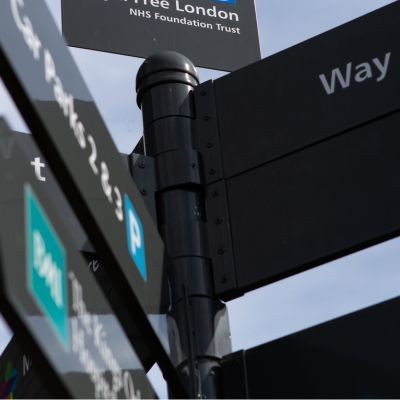Our children’s physiotherapy service offers a variety of specialist clinics, as detailed below.
There are weekly physiotherapy advice and screening clinics at Gospel Oak Health Centre for children under two years old. These are booked by health visitors if there are concerns about motor skills.
In these clinics, the physiotherapist offers a 30-minute assessment appointment. The outcome of the assessment will be one of the following:
- advice and reassurance
- advice and a maximum of three physiotherapy appointments at Gospel Oak Health Centre
- advice and a referral made by the health visitor for on-going physiotherapy when more than three appointments are recommended by the assessing physiotherapist
- advice and referral made by the health visitor to another healthcare professional in the multidisciplinary team
Children’s physiotherapists liaise closely with the Camden and Islington Wheelchair Service to support and advise children and young people on wheelchair provision.
Children’s physiotherapists are involved in treating babies and children with Down’s syndrome and, depending on their individual needs, work closely with the multidisciplinary team.
Physiotherapists assess and promote positioning and offer exercise programmes and advice to promote the development of gross motor skills. Treatment may be provided in a group situation.
This is a specialist clinic which offers a consultation with a paediatrician at the Royal Free Hospital.
A specialist physiotherapist is present to assess children with motor difficulties and offer advice about activities and treatment.
Botulinum toxin (botox) is a treatment which may benefit children with a movement disorder. Injecting botulinum toxin into overactive muscles can cause a temporary relaxation.
The botulinum toxin service is provided for children with a neurological presentation, eg cerebral palsy, who have focal increased muscle tone that is interfering with function, personal care, positioning in equipment or causing pain. It is offered for children and young people between two and 18 years.
Children are initially assessed in the neuro-disability clinic and referred into the botulinum toxin clinic for a comprehensive assessment by the doctor and physiotherapist.
If it is considered that botulinum toxin could be of benefit, there will be discussion with the child, parents/carers and multidisciplinary team so it can be combined with an exercise or postural management programme.
Botulinum toxin injections take place at the Royal Free Hospital.
Children known to the children’s physiotherapy service may be referred to the joint physiotherapist and orthotist clinic for assessment.
Children referred to this service may need splints (orthoses) which are ordered off the shelf or, if required, custom-made. These may include leg splints, insoles, specialist footwear and lycra garments.
In the clinic, children are assessed and measured for the appropriate item and this may involve taking a plaster cast mould.
As many items are bespoke, it can take two-to-four weeks before they can be fitted.
Children who walk on their tiptoes beyond what is normally expected in typical development (normal variants) may be referred to the toe-walker clinic for assessment via the single point of referral (SPOR) system.
Children referred to this service for ankle range and gait monitoring are provided with advice and exercises to help increase or maintain their muscle length and improve function, and are sometimes treated with serial casting if required.
Ponseti is the gold standard, evidenced-based treatment for babies with talipes equinovarus, structural talipes, fixed talipes and club foot. The Ponseti method has a success rate of over 90%.
Babies are referred into the service and assessed at around the age of two weeks by a paediatric orthopaedic consultant and a specialist paediatric physiotherapist. They have a full assessment and if Ponseti treatment is required, it involves three phases:
- Casting: weekly casting for approximately five weeks.
- Tenotomy: small surgery under local anaesthetic to the achilles tendon/heel cord carried out by a paediatric orthopaedic surgeon, followed by a further three weeks of casting.
- Foot abduction brace/boots and bar: these are boots attached to a bar that are worn to maintain the foot correction. These are worn for three months for 23 hours and then at night and naptime until the child reaches five years of age.
Referrals to the Ponseti service are made by paediatricians, midwives and GPs. This is a tertiary service and the service is not restricted to children with Camden GPs.
Find out more about the Ponseti method and the Steps Charity Worldwide.
 Translate
Translate

